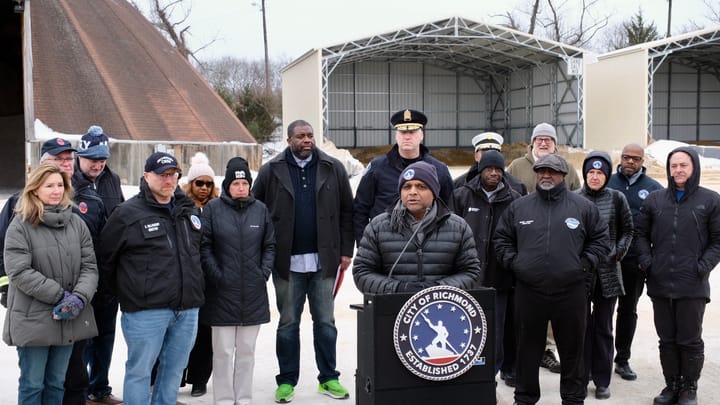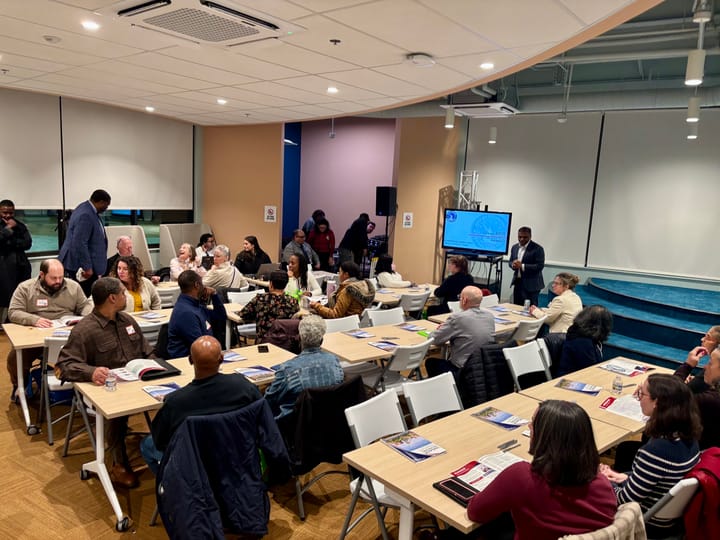How Richmond ended up with a $5.8M bill for a decades-old wrongful conviction

When four former sailors were newly exonerated and seeking compensation in 2018 for being wrongfully convicted of rape and murder in 1997, they reached a combined deal that involved a $3.5 million payment from the state and $4.9 million from the city of Norfolk.
The concept that arose from the infamous Norfolk Four case — that when misconduct by state and local authorities deprives Virginians of their freedom it’s both a state and local responsibility to compensate them highly — eventually made its way into state law.
It was a recent change to that law that got Richmond in hot water with Gov. Glenn Youngkin over a $5.8 million payment the governor says the city has to make to a wrongfully convicted man within a few weeks or risk losing an unknown amount of state funding.
It’s not just the Republican governor who thinks Richmond has to pay up.
Del. Rip Sullivan, D-Fairfax, who wrote the state law at issue, said “Richmond is obligated to pay it.”
“That is the statute that we passed,” Sullivan said in an interview Tuesday. “The governor is doing what we directed him to do in that statute.”
City officials have not yet said if they intend to make the payment to Marvin Grimm, whose wrongful incarceration for a 1976 conviction is the longest in Virginia history.
On Tuesday, Mayor Danny Avula sent Youngkin a letter saying the city "intends to move toward a complete resolution of the matter shortly."
"The legislation referenced in your letter is new as of July 1, and as you are aware, imposes a significant financial obligation on the city of Richmond," the mayor wrote to the governor. "We are currently reviewing the unfortunate circumstances of Mr. Grimm’s incarceration and the city is fully reviewing the matter and subsequent legislation."
At age 20, Grimm was arrested on murder, abduction and sodomy charges after Richmond police linked him to the death of a 3-year-old boy who disappeared from an apartment complex and was found in the James River.
After being paroled at 65, Grimm was formally exonerated last year.
Thanks largely to new DNA testing that undercut much of the evidence used to convict Grimm, the Virginia Court of Appeals granted him a writ of actual innocence after he spent 45 years in prison. Grimm, who lived across the hall from the family of the boy who had gone missing, confessed to the crime and entered a guilty plea, but he later argued he was coerced into making a false confession after being subjected to 10 hours of interrogation after he had done a nine-hour shift at work. He was also threatened with the death penalty, even though execution wasn’t an allowable punishment for the alleged crime.
Recounting his story for General Assembly members this year, Grimm said he confessed in a state of exhaustion and because “the thought of dying scared me.” After the conviction, he said, his wife left him, taking the couple’s newborn son with her and out of Grimm’s life entirely.
“I lost 96% of my adult life,” said Grimm, now 70. “Because of that, I missed out on all the things that most folks take for granted: Weddings, birthdays, family trips and holidays.”
The unusually long amount of time Grimm spent behind bars, his continued inclusion on Virginia’s sex offender registry even after he was paroled in 2020 and the level of malfeasance that led to his conviction all contributed to the large sum he’s now owed after clearing his name.
Sullivan, who also sponsored the companion General Assembly legislation that gave Grimm $5.8 million in compensation from the state, said he hopes Richmond can reach an agreement with Grimm so he can “go back to living whatever is left of his life in peace.”
“No amount of money can right the wrong here. That’s impossible to do,” Sullivan said. “But this is the system we have to try to recognize the awful thing that happened to Mr. Grimm. And frankly, dragging this out simply reopens an old wound and keeps him and his family from getting any kind of final closure.”
The city has given no public signals about what it plans to do, and appears to have been largely unresponsive on the matter for several weeks if not months.
In a June 17 letter to city officials, Grimm’s attorney said he had heard Avula might be open to a meeting regarding the payment.
“We have contacted the mayor's office on several occasions to schedule such a meeting without success,” wrote Jeffrey Horowitz, an attorney with the Arnold & Porter law firm. “We have not received any responses to our follow-up inquiries."
The city declined to comment Monday morning on Youngkin’s demand that Richmond pay Grimm. No one raised the issue publicly when the City Council got an update from Avula Monday afternoon and had the opportunity to ask him questions. However, the Council held a closed-door session to discuss unexplained legal matters, a sign city officials could have discussed the Grimm case in private.
It’s not clear if the city would have to amend its budget to reallocate money for a Grimm payment. There are no Council meetings in August, which means the Council isn’t scheduled to convene again before the governor’s Aug. 15 deadline to pay or risk the loss of state funds.
The origins of the new law
The new requirement that Richmond make restitution for a wrongful conviction whether it wants to or not grew out of a state-level push to boost compensation for victims who have faced particularly severe mistreatment from the justice system.
State law lays out a process for how that compensation can be obtained and how much is owed, partly to avoid lengthy lawsuits that could force former prisoners to spend much of their newfound freedom in court proceedings and potentially lead to more costly payouts ordered by juries.
Under Virginia law, wrongfully convicted people are entitled to compensation based on how many years they were incarcerated. That amount was set at $55,000 per year but rises with inflation. Victims are entitled to additional compensation for being wrongfully convicted of particularly heinous crimes that put them on death row or the sex offender registry.
The compensation can double in cases where state or local authorities intentionally pushed to convict an innocent person by fabricating or suppressing evidence.
And in a fairly recent change, the total compensation can double again in cases where wrongdoing by both state and local officials warrants both state and local restitution.
As he explained his bill in committee hearings this year, Sullivan said the goal was to allow compensation to quadruple for particularly egregious cases. But because of the way the Norfolk Four case was settled — with the wrongfully convicted men getting money from the locality only after suing and receiving a settlement — the law said additional compensation for intentional wrongdoing was only allowed when the locality agrees to it.
“What it does is it gives localities a veto power over what we can do,” Sullivan said at one hearing. “What about a locality that either won’t match it or a locality that can’t match it?”
The local wrongdoing in the Grimm case, according to the General Assembly legislation granting Grimm relief, were the "coercive tactics” and “suggestive prompting” used by Richmond police to get a false confession that aligned with officers’ theory of the case. The confession didn’t explain some details of the case, such as why alcohol and drugs were found in the boy’s system.
Grimm’s case also involved substantial wrongdoing by prosecutors representing the state and Mary Jane Burton, a former state crime lab analyst whose work was so flawed and arguably misleading it recently sparked a broader review by state officials. Though testing performed on an oral swab could have excluded Grimm as a suspect because it didn’t match his blood type, state officials buried the significance of the test and didn’t deviate from the prosecution of Grimm.
The previous system, Sullivan said, could have put people like Grimm in the position of getting paid by the state, but still having to sue local officials to receive compensation for local misconduct.
“My guess is… if we force someone to file a lawsuit who’s been deprived of 45 years of his or her life, that’s going to be a big number,” Sullivan said. “Any jury is going to give that person a big number.”
At one hearing, Del. Delores McQuinn, D-Richmond, said state policy should be written to avoid the “additional harm” of forcing people to hound local officials for compensation.
“To put any responsibility on them I just think it would be another form of injustice and disservice,” McQuinn said. “They should not have to go out and sue anyone.”
The revised law the General Assembly approved effectively removed the local veto power. It declares that if the state deems additional compensation is warranted for intentional wrongdoing, the locality has to match the amount agreed to by the state.
“I hope this legislation will work as a deterrent to those that may be helping to bring false evidence,” Del. Karen Keys-Gamarra, D-Fairfax, said as she thanked Sullivan for presenting the bill.
During the legislative session, Sullivan repeatedly invoked the Grimm case and Richmond while making the case that localities should not be able to avoid fulfilling what he sees as both a legal and moral obligation.
It’s not clear how much state funding could be at stake if the city resists paying Grimm or doesn’t make a decision before the deadline set by the governor.
The new law says that if a locality fails to pay, the governor can order state officials to “withhold all further payment” to the locality “for any and all purposes, until such compensation is paid to the person.”
A few days before Youngkin sent the letter to Richmond officials, Grimm’s attorney asked the governor to invoke the enforcement power given to him under the new law sponsored by Democratic legislators.
“Recognizing that a locality might not immediately comply with the mandate to compensate a wrongfully incarcerated individual in an additional amount equal to that paid by the Commonwealth, the amended statute provides a remedy,” Horowitz wrote to Youngkin.
Contact Reporter Graham Moomaw at gmoomaw@richmonder.org
The Richmonder is powered by your donations. For just $9.99 a month, you can join the 1,000+ donors who are keeping quality local journalism alive in Richmond.






